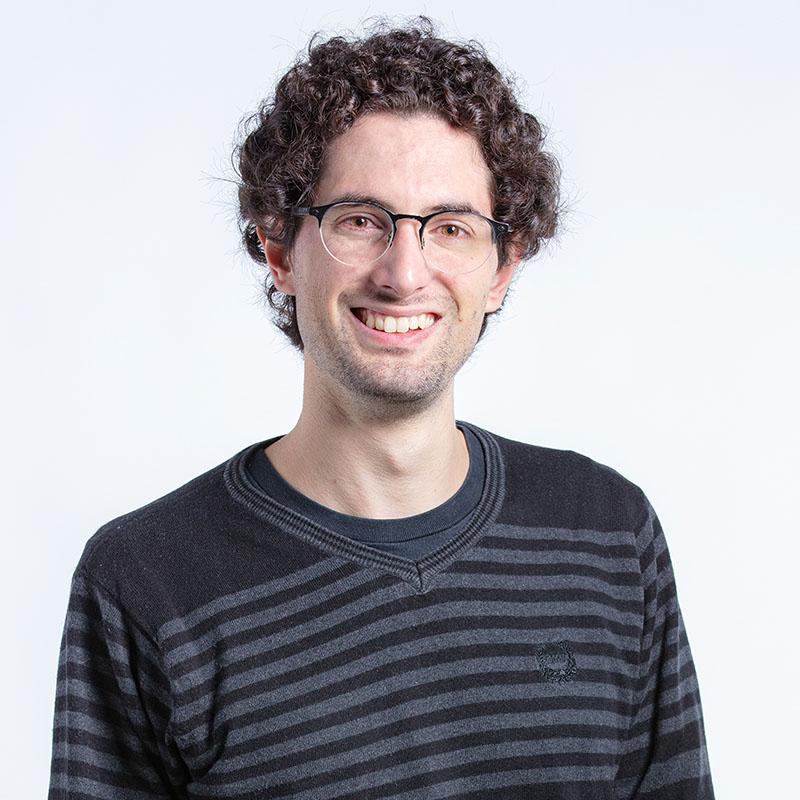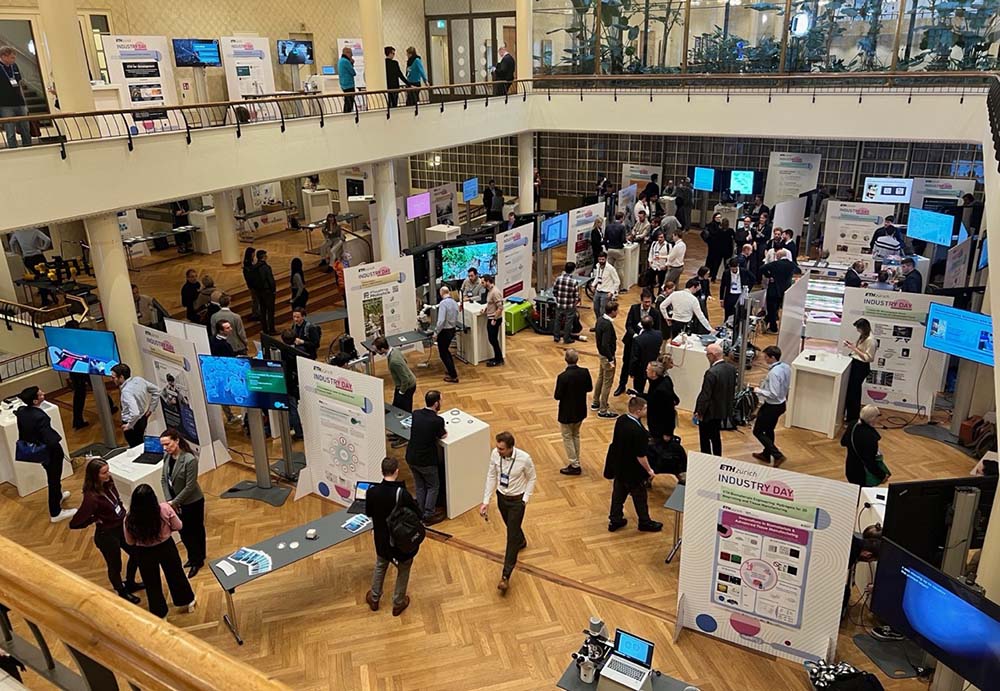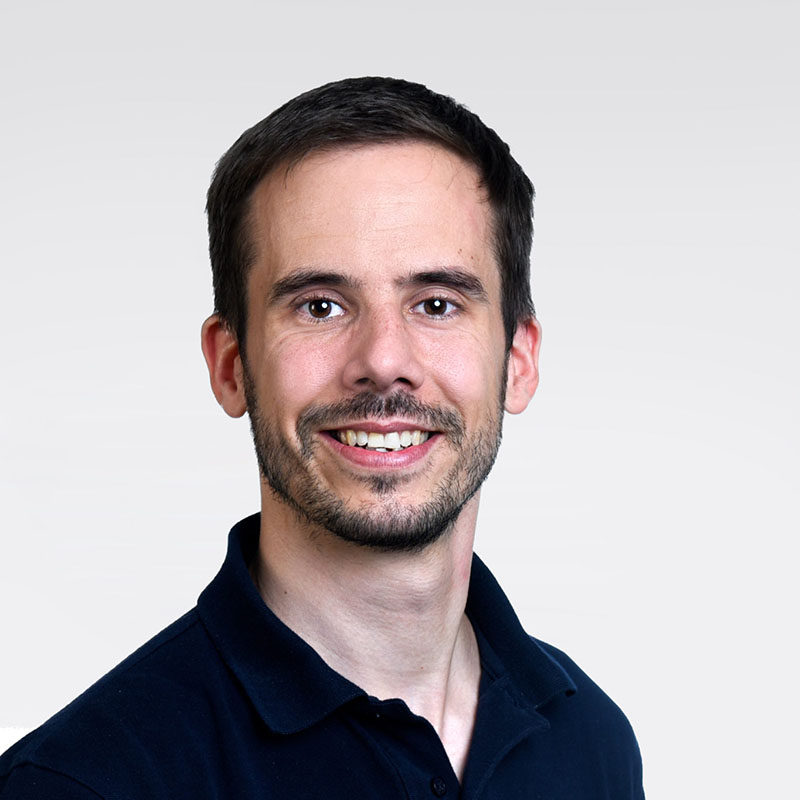
Exklusiver KI-Check-up für KMU


Saurabh Bhargava, joined the SDSC as a Principal Data Scientist in the Industry Cell at the Zürich office in 2022. Saurabh previously worked in the retail sector and the advertising industry in Germany. He lead and built various data products for customers using state of the art machine learning methods and industrializing them thereby adding value for the customers. He completed his PhD from ETH Zürich in June 2017 specializing in machine learning applications on Audio data. He obtained his Master’s and Bachelor’s degrees from EPFL and Indian Institute of Technology (IIT), Roorkee, India in 2011 and 2009 respectively. His interests and expertise are in combining state of the art data science and data engineering tools for building scalable data products.


Matthias Galipaud obtained his PhD in evolutionary biology in 2012 from the University of Burgundy in Dijon (France), and held postdoctoral positions as a mathematical biologist at the university of Bielefeld (Germany) and the university of Zurich, where he researched the evolutionary theories of aging and mate choice. In 2020, he became a data scientist, developing machine learning solutions for startups in Switzerland and Australia before joining the SDSC Innovation Team in November 2022.


Dan received an MSc in civil and environmental engineering from UC Berkeley and a Ph.D. from EPFL, where he developed models combining machine learning and geographic information systems to estimate renewable energy potentials on a large scale. After serving as a researcher/data scientist at Unisanté (Lausanne) and completing a one-year postdoc at the Quebec Artificial Intelligence Institute (Mila) in Montréal, Dan joined the SDSC Innovation team. His work has generally been focusing on crafting and tailoring machine learning methods and deep learning architectures for a variety of domains, most notably the spatio-temporal modeling and forecasting of environmental and energy related variables, as well as multiple applications in public health research.


Before joining SDSC, Arshjot Khehra received his MSc in Artificial Intelligence from USI Lugano, where he completed his thesis on hierarchical graph reinforcement learning. Previously, he worked for 4+ years across India and Singapore gaining data science experience in insurance, logistics, and manufacturing sectors. He also holds a BSc in Industrial Engineering from PEC Chandigarh. Over the course of his career, Arshjot worked on a wide array of projects, such as, handwritten text recognition and generation, voice matching across phone call recordings, policy lapse rate prediction for customer retention, and automated insurance claim processing.


Silvia holds an MSc in Computer Science from EPFL and a PhD in Computer Science from the University of York, UK. She has been a senior research fellow at the University of Trento and later at Politecnico di Milano, Italy. Here, she had the chance to work on Marie Curie and ERC projects relating to natural language processing. From 2012 to 2019, she was a Senior Manager and NLP expert at ELCA Informatique Switzerland, whose AI department she helped create and expand. Silvia joined the Swiss Data Science Center in 2019 and is currently its Chief Transformation Officer, in charge of the team leading organizations to digital transformation.

Presentation
Als Programmpunkt der Informatiktage 2025 haben die Standortförderung des Kantons Zürich, die ETH Industry Relations und das Swiss Data Science Center (SDSC) ein spezielles Programm für KI-interessierte Unternehmen entworfen - einen exklusiven KMU-Anlass, der den Nutzen von KI näher bringt und konkrete Ansätze und Hilfestellungen für Ihren Unternehmensalltag aufzeigt.
Nachbericht: Den Report der Informatiktage 2025 inklusive einer Kurzzusammenfassung dieser Veranstaltung lesen Sie hier.
Entmystifizieren Sie das grosse Thema KI und lernen Sie anhand von Praxisbeispielen, wie man mit kleinen Schritten eine gezielte Wirkung entfalten kann. Diskutieren Sie beim ausgedehnten Frühstück Ihre aktuellen Herausforderungen mit unseren Experten. Während des Check-ups prüfen unsere SDSC-Experten die KI-Tauglichkeit Ihres Unternehmens anhand Ihrer Informationen und Daten. In Einzelgesprächen skizzieren sie Ansätze für das KI-Potenzial und Einsatzmöglichkeiten in Ihrem Unternehmen. Lassen Sie sich beraten, auf welche Fragestellungen welche KI-Methoden die effektivsten Antworten liefern können.
Teilnahmebedingungen: Die Teilnahme war kostenfrei. Um Ihnen den grösstmöglichen Mehrwert zu bieten, halten wir die Zahl der Teilnehmenden klein. Bewerben Sie sich jetzt für dieses einzigartige KI-Check-up Programm! Anmeldeschluss war Freitag, der 14.03.2025.
Veranstalter:
Das Swiss Data Science Center, Standortförderung des Kantons Zürich, ETH Industry Relations
Details
KI-Check-up für KMU
Freitag, 28. März 2025
8:30 - 12:00 Uhr mit Brunch
“Swiss AI Tower" - Andreasturm (14. Etage)
Andreasstrasse 5
8092 Zürich-Oerlikon
Programme
Programm:
08:30 Ankunft & Kennenlernen bei Kaffee, Gipfeli & Müsli
09:00 Einführung, Informations- und Datenanalyse
· Vorstellung SDSC, Standortförderung Kanton Zürich, ETH Industry Relations
· Einführung: Entmystifizierung der KI für KMU
· Fallstudien: KI in der Produktion, Logistik und Dienstleistung
· Auswertung eingereichter Problemstellungen
10:00 „KI-Check-up“: Einzelfallbesprechung à ca. 20-25 min | Brunch-Buffet
11:30 Offene Feedbackrunde & Zusammenfassung
12:00 Veranstaltungsende
Über das Swiss Data Science Center (SDSC)
Ab 2025 agiert das Swiss Data Science Center (SDSC) als nationale Forschungsinfrastruktur mit dem Auftrag, effizientes Datenmanagement, maschinelle Lernmethoden und KI in der gesamten Schweiz zu etablieren und die digitale Transformation von Schweizer Unternehmen und Organisationen zu unterstützen. Mehr Informationen: www.datascience.ch
Über die Standortförderung im Amt für Wirtschaft, Kanton Zürich
Wir fördern Innovationen und unterstützen Unternehmen – von der Gründung bis zur Vernetzung in den Zürcher Schlüsselbranchen. Mit unserer Plattform «Innovation Zurich» bieten wir Orientierung sowie Informationen zum Innovationsstandort. Ansässige Unternehmen unterstützen wir mit dem Angebot «KMU und Innovation» bei ihren Innovationsvorhaben. Zudem sind wir auch Anlaufstelle für Anliegen von ansiedlungsinteressierten Unternehmen. Weitere Informationen finden Sie unter: zh.ch/standort | innovation.zuerich | kmu-innovation.zuerich
Über ETH Industry Relations
Sucht Ihr Unternehmen Forschungspartner an der ETH Zürich? ETH Industry Relations unterstützt Sie bei der Suche nach kompetenten Partnern, organisiert Besuche und Workshops und bietet Beratung zu Finanzierungsmöglichkeiten für Forschungskollaborationen. Mehr Informationen: https://ethz.ch/de/wirtschaft/industry/collaborations.html
Other events

The Energy Data Hackdays 2026 - Swiss Romande Edition


Roberto holds an M.Sc. and a Ph.D. in Particle Physics from the University of Torino, Italy. He has worked for several years in fundamental research as a senior fellow and data scientist at the CERN Experimental Physics division and on a research project supported by the Belgian National Fund for Scientific Research (FNRS). In 2018 he moved to EPFL to work on data mining and Machine Learning techniques for the built environment and renewable energies. He has started and led multiple collaborations with academic and industry partners in the energy domain. Roberto joined the SDSC in September 2021 as a Principal Data Scientist with the mission of accompanying industries, NGOs and international organizations through their data science journey.


Valerio started his career working for 7 years as a particle-physics researcher at CERN. In 2016, he moved to consulting, applying data science in several industries. First, he joined the Quant team of Ernst & Young in Geneva. Later, he created his own company, SamurAI sàrl, providing consulting services for his clients. He also has a passion for teaching very complex subjects in simple terms. That is why he particularly enjoys offering training programs to private companies and universities. Valerio joined the SDSC in May 2022 as a Principal Data Scientist with the mission of accompanying industrial partners and other institutions through their data science journey.


After earning a MSc in Theoretical Physics at University of Padua, Giulio graduated in Quantitative Finance from Bocconi University. Before joining the SDSC industry cell in June 2021, he spent a few years working in the financial sector, where he mainly dealt with the application of machine learning to financial risk management. When not coding, Giulio spends his free time playing bass guitar, hiking and cooking.

Deep Dive – Enabling Innovation with AI in Health and Biomedicine


Nora earned her Ph.D. in Computer Science/Bioinformatics from the University of Tübingen, where she focused on the in silico design of peptide-based vaccines using combinatorial optimization and machine learning. During her postdoctoral fellowship at Memorial Sloan Kettering Cancer Center in New York, and later as a staff scientist at the New York Genome Center, she worked on metagenomics, infectious diseases, and cancer. In 2015, Nora joined NEXUS Personalized Health Technologies at ETH Zurich where her focus shifted towards the management of clinical and biomedical research data. In May 2024, she joined the Swiss Data Science Center as Head of Biomedical Data Science.


Federico holds a M.Sc. in Engineering and a Ph.D. in Sustainable Development and Innovation Engineering. After a three-year Postdoc in Environmental Data Mining at the University of Lausanne, in 2021 he joined the Swiss Data Science Centre, where he now works as Senior Data Scientist supporting the acceleration of the digital transformation within industries, NGOs and public bodies. Over the years he worked on the development of methodological tools to mine and model big spatiotemporal datasets. He has deep competencies in applied statistics, machine learning, geocomputation, spatial statistics, remote sensing.


Johanna joined SDSC in August 2025 as Site & Program Lead.
She is responsible for leading SDSC’s strategic programme with the State of Vaud, supporting innovation-driven projects that unite academic excellence, SMEs, and public sector actors. Johanna also oversees SDSC’s flagship space located at the Biopôle campus in Lausanne, where she is based. Prior to joining SDSC, Johanna gained over 15 years of experience in operations and project management across service and not-for-profit organizations. Since 2020, she has been deeply engaged in the tech ecosystem of the region. She contributed to the growth of Unit8 SA, a Swiss AI & Data Science consulting firm, during its transition from start-up to scale-up, and later served as Project Manager at the unlimitrust campus by SICPA, where she built strategic collaborations within the Swiss and international innovation landscape. Johanna holds degrees from EHL Hospitality Business School and HEC Lausanne.

ETH Industry Day 2025 @ Open-i


Saurabh Bhargava, joined the SDSC as a Principal Data Scientist in the Industry Cell at the Zürich office in 2022. Saurabh previously worked in the retail sector and the advertising industry in Germany. He lead and built various data products for customers using state of the art machine learning methods and industrializing them thereby adding value for the customers. He completed his PhD from ETH Zürich in June 2017 specializing in machine learning applications on Audio data. He obtained his Master’s and Bachelor’s degrees from EPFL and Indian Institute of Technology (IIT), Roorkee, India in 2011 and 2009 respectively. His interests and expertise are in combining state of the art data science and data engineering tools for building scalable data products.


Anna joined SDSC as a Data Scientist focusing on industry collaborations in July 2019. She completed her PhD in Bioinformatics at the University of Luxembourg, where she analysed large-scale heterogeneous datasets and leveraged multiple disciplines: Statistics, Network Analysis, and Machine Learning. Before joining SDSC, Anna worked as a Data Scientist at Deloitte Luxembourg, with a focus on computer vision and time-series analysis.Currently, Anna is a Principal Data Scientist based at the ETH Zurich office, where she leads biomedical collaborations with industry partners. Anna works on a range of projects: protein properties prediction, biomanufacturing optimization, statistical model evaluation and others.


Nora earned her Ph.D. in Computer Science/Bioinformatics from the University of Tübingen, where she focused on the in silico design of peptide-based vaccines using combinatorial optimization and machine learning. During her postdoctoral fellowship at Memorial Sloan Kettering Cancer Center in New York, and later as a staff scientist at the New York Genome Center, she worked on metagenomics, infectious diseases, and cancer. In 2015, Nora joined NEXUS Personalized Health Technologies at ETH Zurich where her focus shifted towards the management of clinical and biomedical research data. In May 2024, she joined the Swiss Data Science Center as Head of Biomedical Data Science.


Marisol has a degree in Law and more than 15 years of experience working as a notary officer in Madrid. After relocating to Switzerland with her family, she obtained a certification to teach Spanish as a foreign language, dedicating four years to teaching Spanish online to students of all ages and backgrounds. Marisol has returned to her professional roots as an administrative assistant, joining the SDSC team in June 2023.


Luis is originally from Spain, where he completed his bachelor's studies in Electrical engineering, and the Ms.C. on signal theory and communications, both at the University of Seville. During his Ph.D. he started focusing on machine learning methods, more specifically message passing techniques for channel coding, and Bayesian methods for channel equalization. He carried it out between the University of Seville and the University Carlos III in Madrid, also spending some time at the EPFL, Switzerland, and Bell Labs, USA, where he worked on advanced techniques for optical channel coding. When he completed his Ph.D. in 2013, he moved to the Luxembourg Center on Systems Biomedicine, where he switched his interest to neuroscience, neuroimaging, life sciences, etc., and the application of machine learning techniques to these fields. During his 4 and a half years there as a Postdoc, he worked on many different problems as a data scientist, encompassing topics such as microscopy image analysis, neuroimaging, single-cell gene expression analysis, etc. He joined the SDSC in April 2018. As Lead Data Scientist, Luis coordinates projects in various domains. Several projects focus on the application of natural language processing and knowledge graphs to the study of different phenomena in social and political sciences. In the domains of architecture and engineering, Luis is responsible for projects centered on the application of novel generative methods to parametric modeling. Finally, Luis also coordinates different projects in robotics, ranging from collaborative robotic construction to deformable object manipulation.

Study-a-thon: From Bits to Breakthroughs in Clinical AI Modeling


Oksana is a disruptive innovator bringing her positive energy to projects. Driven by her curiosity and can-do attitude she excels in industrial and academic contexts. Oksana earned her PhD in Life Sciences and Bioinformatics from the University of Lausanne after two MSc in Bioinformatics and in Information Systems from the University of Geneva. For more than 10 years, she has been committed to actively promoting the value of data science and advocating the best practices for reproducible and ethical research. She believes that Swiss Data Science Center is a key player in building a competitive data economy in Switzerland leveraging its innovative potential and renown commitment to quality.


As an EPFL Life Science Engineer, my main interest is to do science with an impact.FAIR principals guide my work style, and I strive for user-centric infrastructure to encompass data science in the biomedical and governmental spheres. I have experience in Global Health, working with multi-hospital surveillance system for pandemics, as well as training data scientist (thegraphcourses.org).My core side-interests lie in ocean conservation notably cetacean conservation, biodiversity, and untreated health problematics from lower and middle income countries.I have solid hard skills in problem-solving, data engineering in AI/ML, and have developed soft skills in creativity and social integration. I have acquired domain knowledge in a diversity of fields: from biology-related sciences such as human gut microbiology, epidemiology, and environmental sciences, as well as social sciences such as anthropology and psychology.I am always happy to engage with new people on innovative and impactful thematics so please do reach out !


Stefan has a background in Biology and decided to move towards evolutionary bioinformatics for both his MSc and PhD.Over the years, he developed a passion for the entire data analysis process: from collecting data, to analyzing and presenting results. Presentations, particularly opportunities for public speaking, are activities he enjoys since he values communication a lot. In order to follow this passion and deepen his knowledge on systems to collect and manage data, he joined SDSC in 2023 as a Biomedical Data Engineer.Outside work, Stefan is an avid reader of sci-fi books (but not only!), enjoys swimming, running, and biking both competitively and casually and enjoys plenty of activities with friends, especially when beer is involved.


Almut Lütge joined the ORDES team in Zurich as Biomedical Data Engineer, in January 2024.
Almut did both her Bachelor and Master in molecular biotechnology with a major in bioinformatics at the University of Heidelberg in Germany.
After her masters she worked as a research assistant on population genetics at the NTNU in Trondheim, Norway.
In 2018 Almut started her PhD about benchmarking of single cell analysis tools at the University of Zürich, followed by a short PostDoc in pharmaceutical immunology at ETH Zürich.
Almut enjoys data-driven problem-solving and highly value open science.

Energy Hack Days 2025


Roberto holds an M.Sc. and a Ph.D. in Particle Physics from the University of Torino, Italy. He has worked for several years in fundamental research as a senior fellow and data scientist at the CERN Experimental Physics division and on a research project supported by the Belgian National Fund for Scientific Research (FNRS). In 2018 he moved to EPFL to work on data mining and Machine Learning techniques for the built environment and renewable energies. He has started and led multiple collaborations with academic and industry partners in the energy domain. Roberto joined the SDSC in September 2021 as a Principal Data Scientist with the mission of accompanying industries, NGOs and international organizations through their data science journey.


Rok obtained a B.A. in Physics from Washington University in St.Louis in 2003. After obtaining his PhD in theoretical Astrophysics from the University of Washington in 2010, Rok spent several years as a Postdoctoral researcher at the Institute for Computational Science, University of Zürich. Seeking new challenges, he moved to the ETH Scientific IT Services group, where he helped researchers across different ETH domains solve their (big) data analysis problems. He specialized in optimizing and scaling up data analysis tasks by mapping them to high-performance computing resources. Since July 2017 he has been at the Swiss Data Science Center developing Renku, the Center's data science platform.

Open Pulse Mini Hackathon


As an EPFL Life Science Engineer, my main interest is to do science with an impact.FAIR principals guide my work style, and I strive for user-centric infrastructure to encompass data science in the biomedical and governmental spheres. I have experience in Global Health, working with multi-hospital surveillance system for pandemics, as well as training data scientist (thegraphcourses.org).My core side-interests lie in ocean conservation notably cetacean conservation, biodiversity, and untreated health problematics from lower and middle income countries.I have solid hard skills in problem-solving, data engineering in AI/ML, and have developed soft skills in creativity and social integration. I have acquired domain knowledge in a diversity of fields: from biology-related sciences such as human gut microbiology, epidemiology, and environmental sciences, as well as social sciences such as anthropology and psychology.I am always happy to engage with new people on innovative and impactful thematics so please do reach out !


Robin joined the SDSC in 2022. He received an MSc. in Management, Economics & Consumer Studies from the University of Wageningen in the Netherlands. After his studies, he developed himself into a consultant in the area of ontology & linked data modelling, working mostly in the domain of local and national infrastructure projects. He has a great interest in standardization efforts in the field of semantic web technology standards and is actively working at SDSC with clients and collaborators to stimulate their adoption.


Carlos Vivar Ríos joined the SDSC in 2023, where he is part of the Open Research Data and Engagement Unit (ORDES). As a multidisciplinary data engineer, he brings a diverse background in biology, cognitive sciences, and bioinformatics from the University of Malaga. His multifaceted professional career spans several disciplines, including genomics at RIKEN in Yokohama, multidimensional image analysis in microscopy at the University of Lausanne (UNIL), and cellular biology modeling at INRIA in Lyon. Carlos has been involved in a variety of projects, such as analyzing astrocyte calcium dynamics, de novo sequencing Solea senegalensis, drug repurposing for Alzheimer's based on GWAS studies, conducting geospatial analysis for linguistic corpora, and assessing drought through remote sensing. He is dedicated to advancing reproducible research methods and actively supports the open science movement.


Oksana is a disruptive innovator bringing her positive energy to projects. Driven by her curiosity and can-do attitude she excels in industrial and academic contexts. Oksana earned her PhD in Life Sciences and Bioinformatics from the University of Lausanne after two MSc in Bioinformatics and in Information Systems from the University of Geneva. For more than 10 years, she has been committed to actively promoting the value of data science and advocating the best practices for reproducible and ethical research. She believes that Swiss Data Science Center is a key player in building a competitive data economy in Switzerland leveraging its innovative potential and renown commitment to quality.
Contact us
Let’s talk Data Science
Do you need our services or expertise?
Contact us for your next Data Science project!
